Les 9 meilleurs programmes gouvernementaux soutenant les entreprises étrangères au Japon
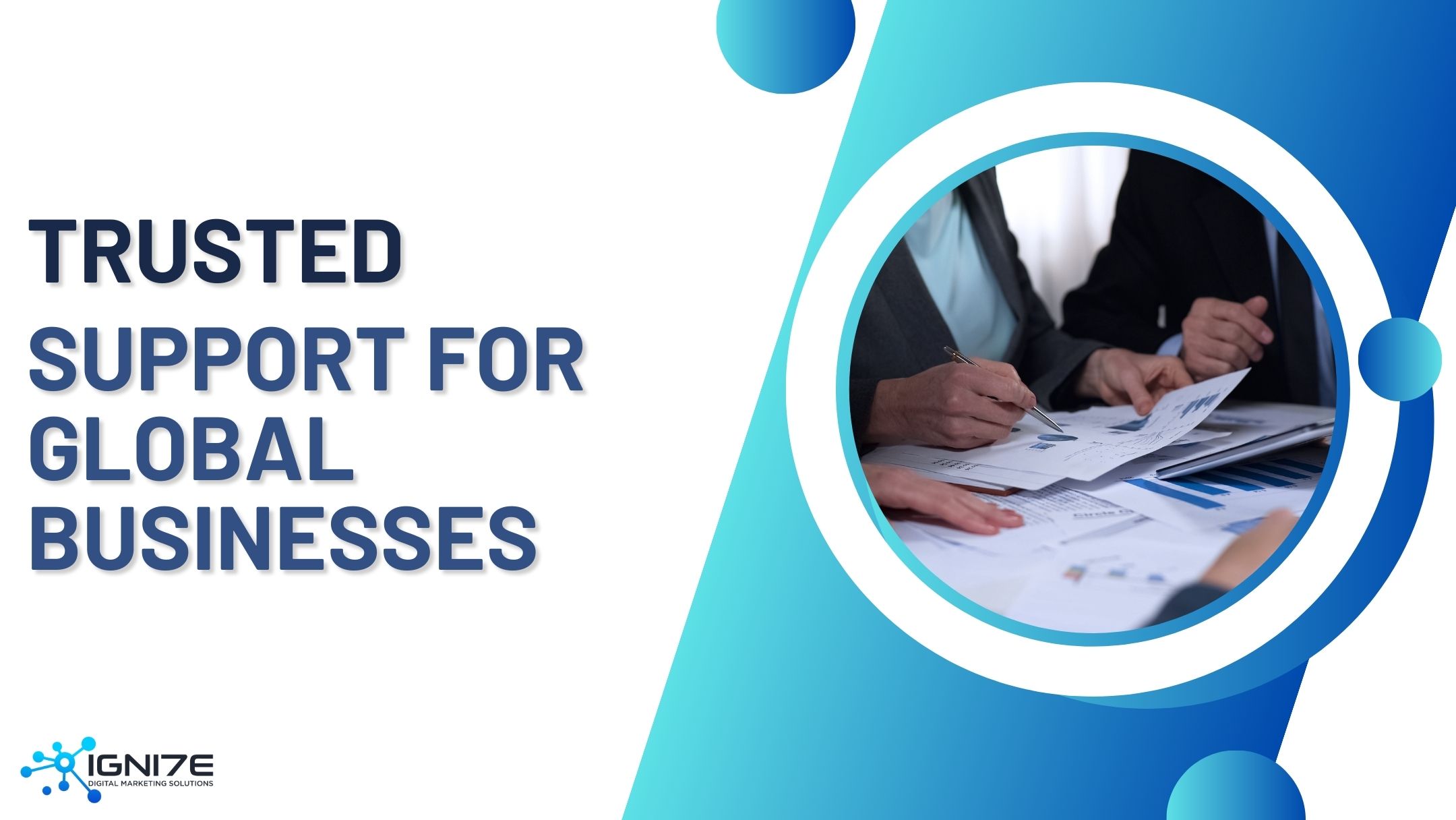
Le Japon est l'une des zones économiques les plus stables et les plus avancées du monde, offrant infrastructure technologique robuste, des systèmes réglementaires bien établis et un marché de consommation mature, ce qui en fait une destination attrayante pour de nombreuses personnes étranger entreprises. Ces dernières années, le gouvernement japonais a adopté une approche proactive pour attirer les investissements étrangers, en mettant en œuvre un large éventail de programmes de soutien et de mesures d'incitation. Qu'il s'agisse de créer une entité juridique, de sécuriser des bureaux, de fournir des services de conseil juridique et fiscal, de recruter des professionnels qualifiés ou de faire face à la déréglementation, le Japon propose un cadre de soutien complet pour répondre à divers besoins besoins de l'entreprise.
Dans cet article, nous présentons 9 programmes de soutien fiables et soigneusement sélectionnés, proposés par des institutions publiques et affiliées au gouvernement japonais pour aider les entreprises étrangères à pénétrer le marché japonais. Pour chaque programme, nous fournissons des explications détaillées, y compris l'éligibilité, les types de soutien, les coûts estimés, des exemples concrets et des liens utiles. Notre objectif est d'offrir un point de départ précieux aux entreprises qui envisagent de pénétrer le marché japonais.
Classement des meilleurs programmes de soutien gouvernemental
1. Loi visant à promouvoir le Japon en tant que centre d'affaires asiatique
2. JETRO » Centre de soutien aux entreprises Invest Japan (IBSC) »
3. Programme régional de soutien à l'investissement direct étranger au Japon (METI & JETRO)
4. « Centre de développement des affaires de Tokyo » du gouvernement métropolitain de Tokyo
5. Programme de soutien financier au démarrage (Agence des services financiers)
6. Système basé sur des points pour les professionnels étrangers hautement qualifiés et visa de démarrage
7. Bac à sable réglementaire et système de clarification des zones grises (METI et autres)
8. Initiative du Grand Nagoya (GNI)
9. Programmes de soutien des centres UE-Japon
1. Loi visant à promouvoir le Japon en tant que centre d'affaires asiatique
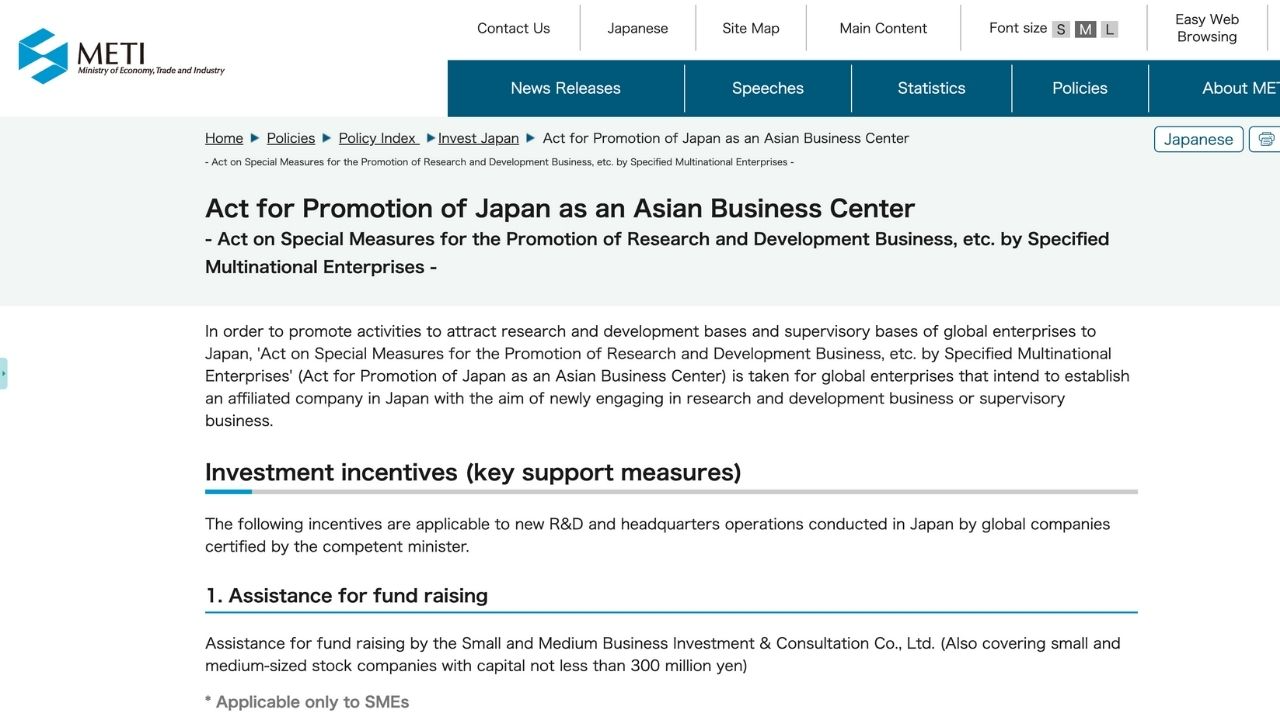
Source : Page d'accueil du METI
Vue d'ensemble
Le nom officiel de ce programme est « Mesures visant à promouvoir l'établissement de fonctions de siège en vertu de la loi sur le renforcement de la compétitivité industrielle ». Cette initiative a été introduite en 2012 pour encourager les entreprises étrangères à établir des sièges régionaux ou des centres de R&D au Japon. Cela fait partie de la stratégie globale du gouvernement japonais visant à positionner le Japon en tant que plaque tournante du marché mondial opérations commerciales.
Assistance fournie
- Incitations fiscales pour les investissements en capital et les dépenses de personnel (par exemple, amortissement immédiat ou crédits d'impôt).
- Procédures de visa accélérées pour les professionnels étrangers hautement qualifiés.
- Exemptions réglementaires et autres mesures d'assouplissement, à condition que l'entreprise soit certifiée dans des catégories spécifiques.
Entreprises éligibles
- Les entreprises étrangères établissent pour la première fois un siège régional ou un centre de R&D au Japon.
- Les entreprises déjà présentes au Japon qui améliorent ou étendent leurs capacités fonctionnelles.
Meilleurs cas d'utilisation
- Les entreprises qui souhaitent établir un siège social dans la région Asie-Pacifique, avec le Japon comme base.
- Les entreprises technologiques qui souhaitent mener des activités de recherche et développement avancées au Japon.
Aperçu des coûts
- Le soutien consiste principalement en des incitations fiscales et des procédures administratives rationalisées ; les subventions directes ne sont pas incluses.
- Les candidatures nécessitent un certain niveau d'investissement et la soumission d'un business plan.
2. JETRO « Centre de soutien aux entreprises Invest Japan (IBSC) »
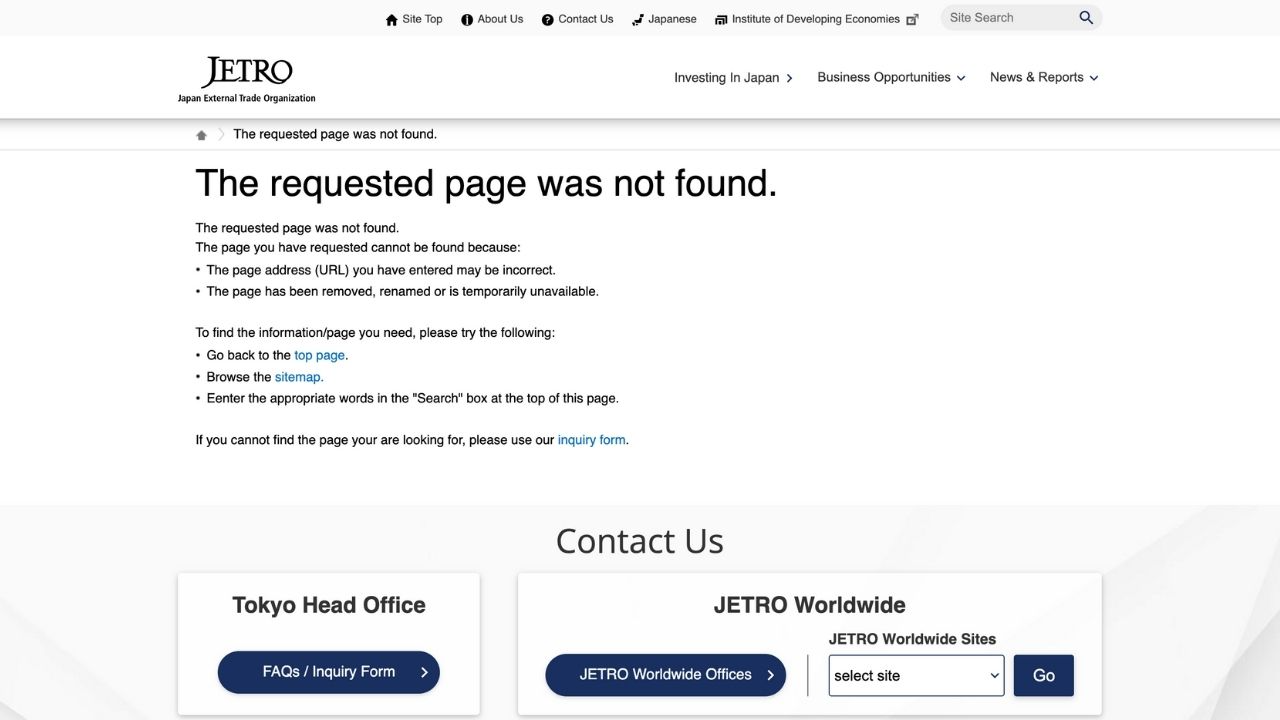
Source : Page d'accueil de JETRO
Vue d'ensemble
Le centre de soutien aux entreprises Invest Japan (IBSC) de JETRO est un centre de soutien complet destiné aux entreprises étrangères qui envisagent de pénétrer le marché japonais. Situé dans six grandes villes :Tokyo, Yokohama, Nagoya, Osaka, Kobe et Fukuoka : l'IBSC propose des consultations gratuites avec des experts et des bureaux temporaires pour aider les entreprises à démarrer leurs activités en douceur au Japon.
Assistance fournie
- Jusqu'à 50 jours d'espace de bureau gratuit.
- Consultations individuelles gratuites avec des experts en affaires juridiques, en droit du travail et en fiscalité.
- Aide à la mise en relation avec les gouvernements locaux et les institutions financières.
Entreprises éligibles
- Les entreprises étrangères qui envisagent de créer une entité juridique au Japon.
- Ouvert à un large éventail d'entreprises, des startups aux PME en passant par les grandes entreprises.
Meilleurs cas d'utilisation
- Les entreprises explorant l'entrée sur le marché et cherchant à évaluer L'environnement des affaires au Japon rapidement.
- Les entreprises qui s'inquiètent du système juridique ou de la fiscalité du Japon.
Aperçu des coûts
- Les consultations et l'utilisation des installations sont généralement gratuites.
- L'enregistrement légal et les frais administratifs pour la création d'une entité ne sont pas inclus.
3. Programme régional de soutien à l'investissement direct étranger au Japon (METI & JETRO)
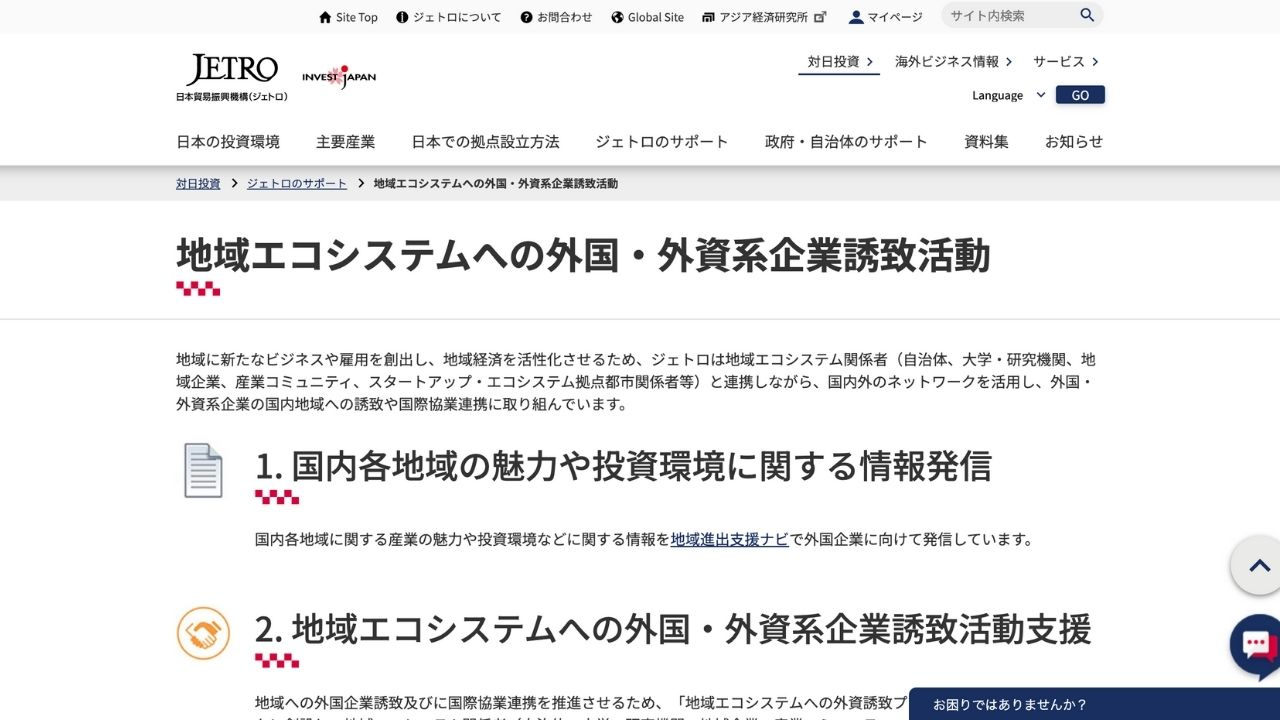
Source : Page d'accueil de JETRO
Vue d'ensemble
Ce programme de soutien est géré conjointement par le ministère japonais de l'Économie, du Commerce et de l'Industrie (METI) et JETRO afin de promouvoir la revitalisation des économies régionales et d'encourager les entreprises étrangères à investir en dehors des grandes zones urbaines. Le programme met l'accent sur la mise en relation des entreprises avec les gouvernements locaux afin d'aligner les besoins commerciaux spécifiques sur les atouts régionaux, en soutenant le développement durable développement des affaires.
Assistance fournie
- Aide à la sélection de sites potentiels grâce à la coordination avec les gouvernements locaux.
- Opportunités de collaborer avec des entreprises locales et universités.
- Conseils sur les programmes de subventions publiques et les incitations des gouvernements locaux.
Entreprises éligibles
- Les entreprises étrangères qui souhaitent s'implanter dans les zones régionales du Japon.
- Les entreprises intéressées par des secteurs enracinés dans la région tels que la fabrication, la biotechnologie et l'agriculture.
Meilleurs cas d'utilisation
- Les entreprises souhaitant bénéficier des avantages économiques des villes régionales.
- Les entreprises qui planifient le développement de nouvelles activités en collaboration avec les ressources régionales du Japon.
Aperçu des coûts
- La coordination et le soutien fournis par JETRO sont généralement gratuits.
- La disponibilité et les détails des subventions ou des incitations gouvernementales locales varient selon les projets.
4. « Centre de développement des affaires de Tokyo » du gouvernement métropolitain de Tokyo
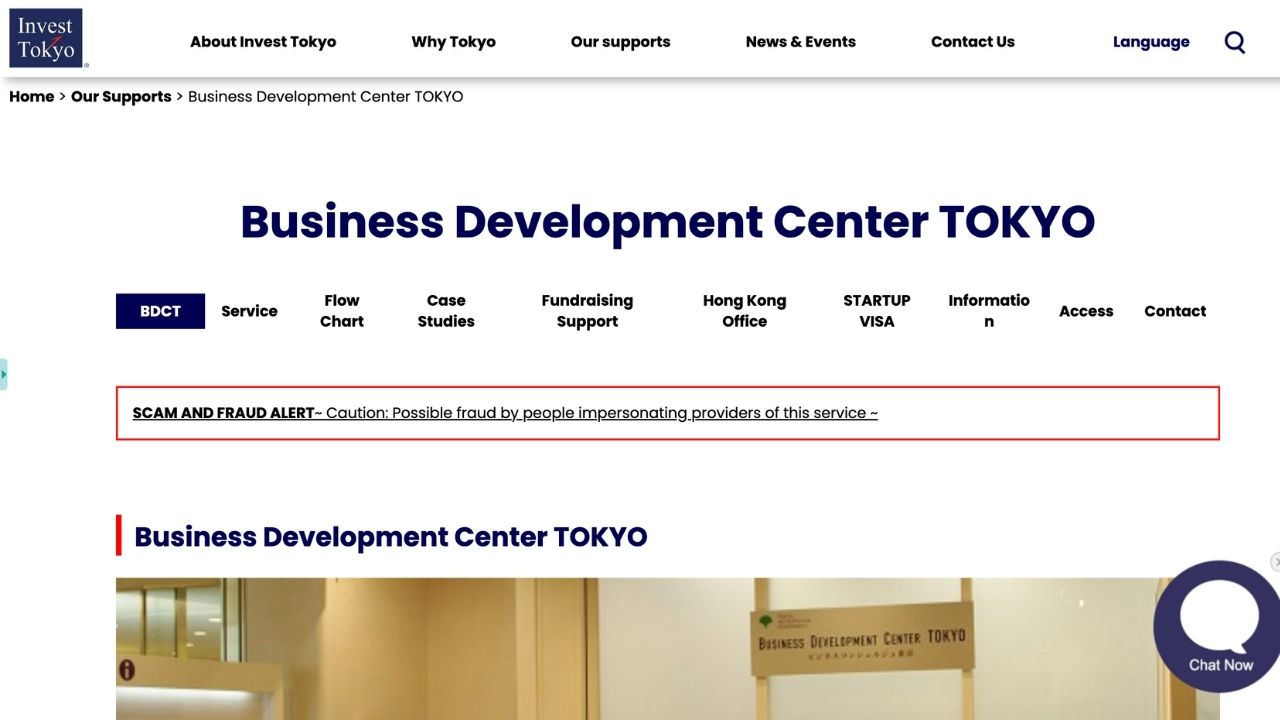
Source : Page d'accueil d'Invest Tokyo
Vue d'ensemble
Il s'agit d'un service d'assistance géré par le gouvernement métropolitain de Tokyo qui offre une assistance complète pour les procédures administratives et la création d'entreprises pour les entreprises étrangères. Un support multilingue est disponible dans Anglais, chinois et plus, aidant les startups étrangères à s'implanter à Tokyo.
Assistance fournie
- Assistance en matière d'enregistrement des entreprises, de fiscalité et de procédures du travail pour les entreprises étrangères.
- Aide à l'ouverture comptes bancaires et l'obtention du statut de résident.
- Fourniture d'informations sur la vie quotidienne et assistance en matière de visas de démarrage pour les entrepreneurs étrangers.
Entreprises éligibles
- Les entreprises étrangères qui souhaitent établir une base à Tokyo.
- Les petites entreprises et les jeunes entreprises entrent pour la première fois sur le marché japonais.
Meilleurs cas d'utilisation
- Les entreprises qui souhaitent faire de Tokyo leur base d'opérations en Asie.
- Les entreprises étrangères préoccupées par la complexité des procédures administratives.
Aperçu des coûts
- Les services sont généralement gratuits (financés par le gouvernement métropolitain de Tokyo).
- Les coûts réels liés à l'enregistrement et aux procédures similaires sont distincts.
5. Programme de soutien financier au démarrage (Agence des services financiers)
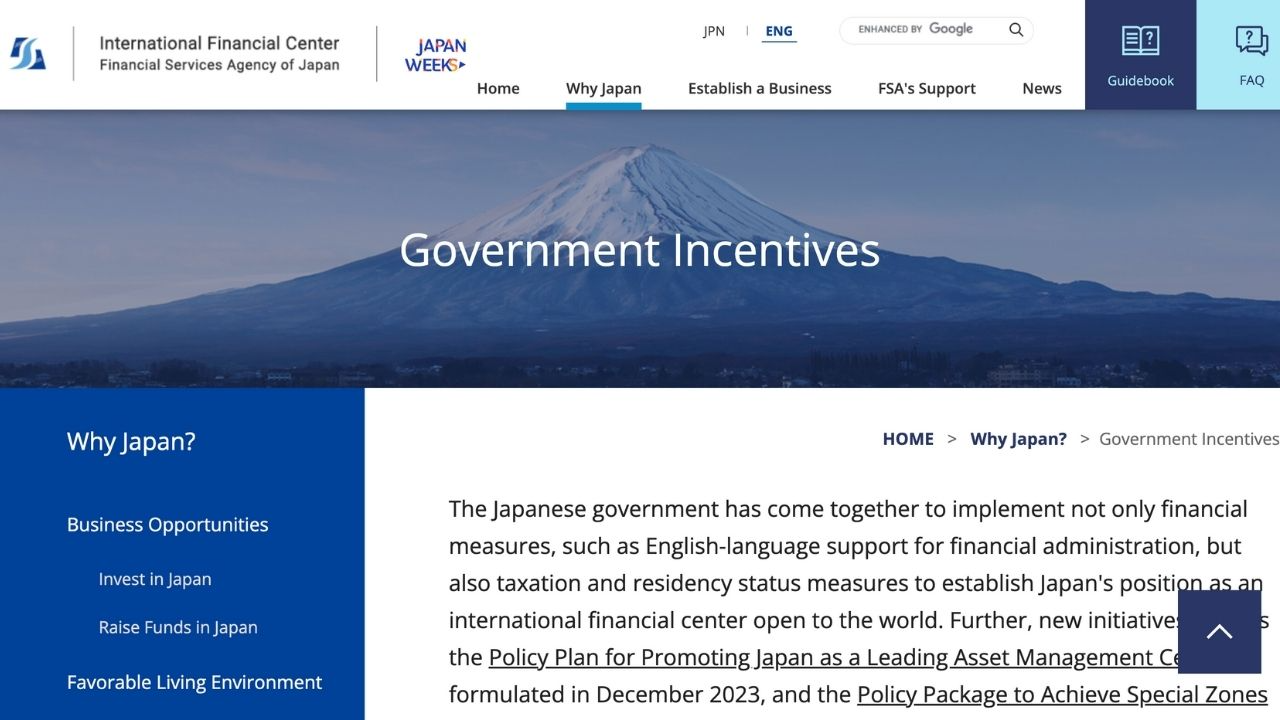
Source : Page d'accueil de la FSA
Vue d'ensemble
Il s'agit d'un programme de subventions proposé par l'Agence des services financiers (FSA) du Japon pour soutenir les startups étrangères des secteurs de la finance et de la gestion d'actifs qui entrent sur le marché japonais. L'initiative se concentre en particulier sur les sociétés FinTech et de gestion d'actifs, dans le but de positionner Tokyo en tant que centre financier mondial de premier plan.
Assistance fournie
- Subventions partielles pour les coûts initiaux lors de l'établissement d'un nouveau bureau au Japon (par exemple, loyer, honoraires professionnels).
- Jusqu'à 20 millions de yens ou 70 % des dépenses éligibles, le montant le plus bas étant retenu.
- Suivi continu assuré par des experts.
Entreprises éligibles
- Les entreprises étrangères dans les secteurs de la finance, de l'investissement, de l'assurance ou des technologies financières.
- Les entités juridiques qui envisagent de s'installer à Tokyo.
Meilleurs cas d'utilisation
- Les entreprises qui entrent sur le marché financier japonais et recherchent des licences ou une expansion commerciale.
- Les startups sont préoccupées par les coûts d'installation initiaux élevés.
Aperçu des coûts
- Le montant de l'aide varie en fonction du dépistage (jusqu'à 20 millions de yens).
- Un plan d'affaires et une ventilation détaillée des coûts sont requis pour la demande.
6. Système basé sur des points pour les professionnels étrangers hautement qualifiés et visa de démarrage
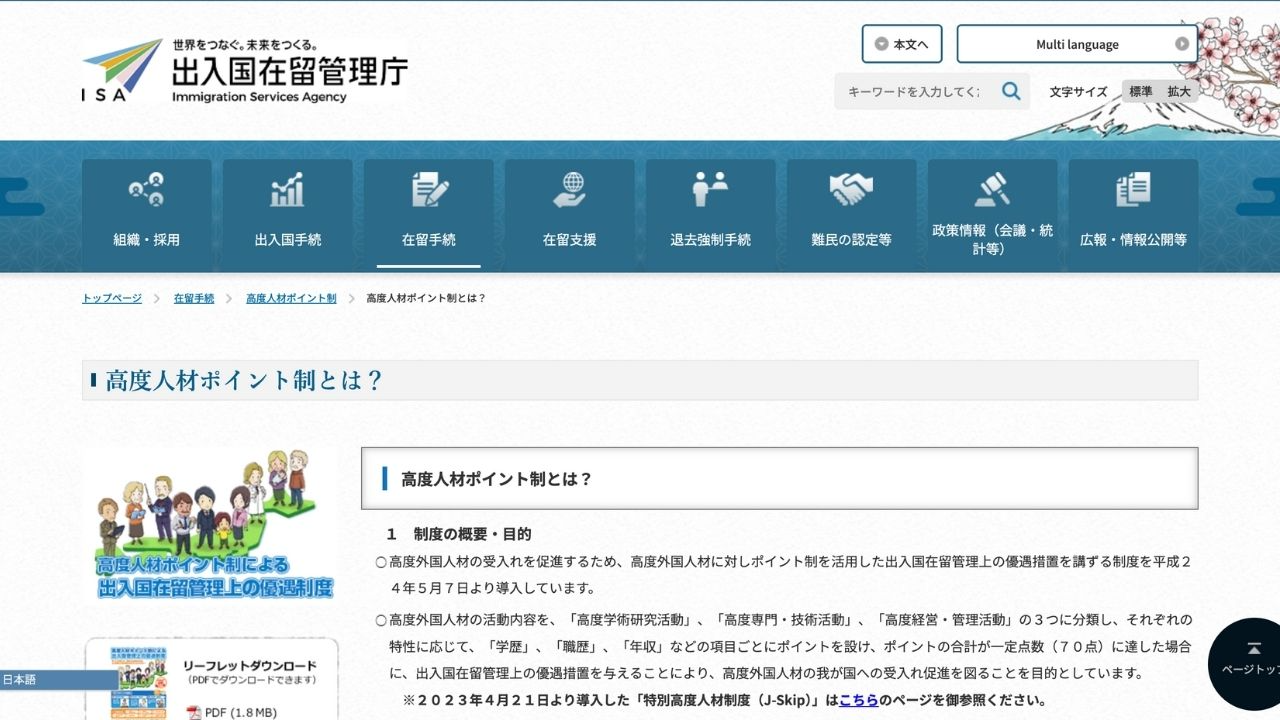
Source : Page d'accueil ISA
Vue d'ensemble
Ce programme est conçu pour attirer des professionnels étrangers hautement qualifiés au Japon en proposant des procédures de visa accélérées et préférentielles. Pour les ressortissants étrangers souhaitant créer une entreprise, de plus en plus de gouvernements locaux délivrent des visas de démarrage, ce qui facilite la création d'une entreprise au Japon.
Assistance fournie
- Statut de résident « professionnel hautement qualifié (i) » ou « (ii) » accordé par le biais d'un système basé sur des points (généralement 5 ans, avec des conditions de résidence permanente assouplies).
- Visas de démarrage délivrés aux entrepreneurs étrangers qui envisagent de créer une entreprise (varie selon les municipalités).
- Des permis de travail pour les conjoints et le statut de personne à charge pour les parents sont également disponibles.
Personnes éligibles
- Les ressortissants étrangers ayant une expertise en gestion, en milieu universitaire ou dans des domaines techniques.
- Les étrangers qui envisagent de créer une entreprise ou une start-up au Japon.
Meilleurs cas d'utilisation
- Les entreprises souhaitant inviter des chercheurs, des ingénieurs ou des cadres étrangers.
- Aide initiale aux entrepreneurs étrangers qui s'installent au Japon.
Aperçu des coûts
- L'inscription est gratuite, mais des frais de service d'experts peuvent s'appliquer pour la préparation des documents.
- Les exigences en matière de visa de démarrage varient selon les autorités locales.
7. Bac à sable réglementaire et système de clarification des zones grises (METI et autres)
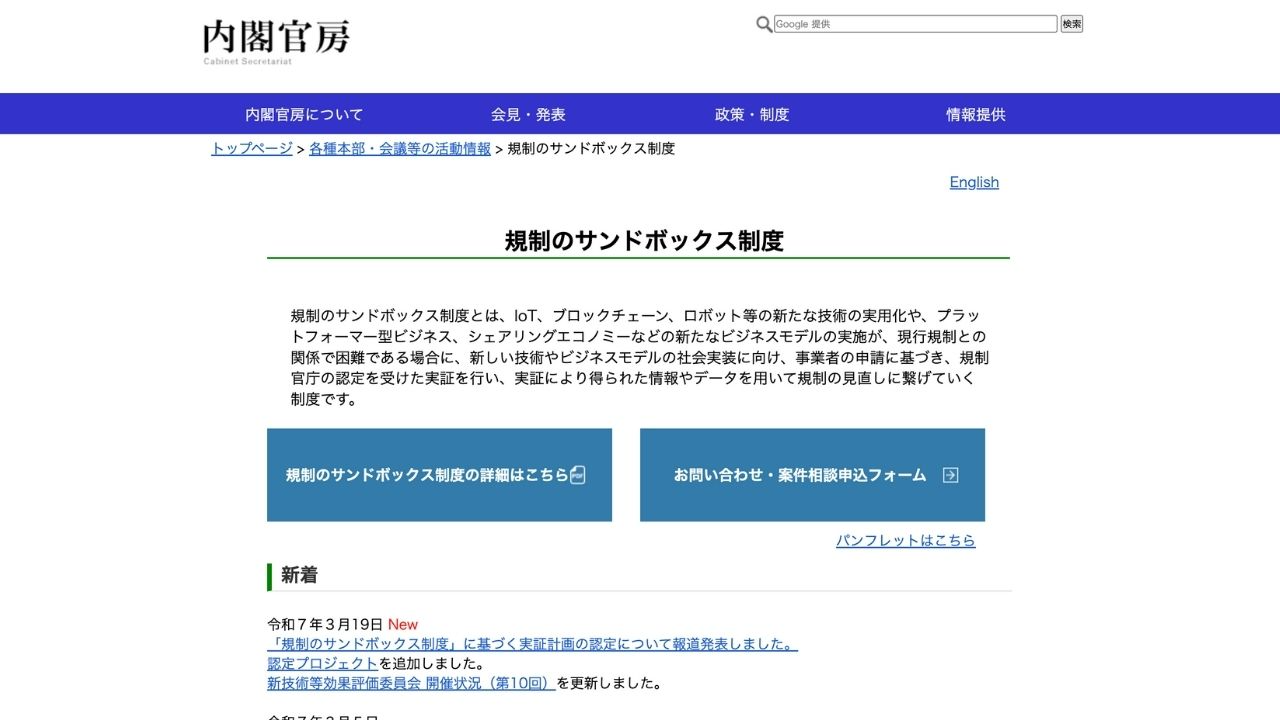
Source : Page d'accueil du Secrétariat du Cabinet
Vue d'ensemble
Ce système permet aux entreprises innovantes de mener des essais de validation de principe sans être limitées par les réglementations en vigueur. Il fournit un environnement réglementaire flexible pour des domaines tels que l'IA, la blockchain, la FinTech et la biotechnologie, soutenant le lancement de nouveaux entreprises au Japon.
Assistance fournie
- Exemptions réglementaires pendant la période de démonstration (mesures spéciales).
- Clarification des interprétations juridiques ou des exemptions d'application (système d'élimination des zones grises).
- Le soutien de groupes d'experts et la coordination avec les agences gouvernementales concernées.
Entreprises éligibles
- Les entreprises étrangères sont incertaines quant aux systèmes juridiques et réglementaires du Japon.
- Startups visant à tester de nouveaux services ou modèles commerciaux au Japon.
Meilleurs cas d'utilisation
- Développement d'innovations intersectorielles telles que la santé × l'informatique ou la finance × l'IA.
- Les entreprises qui cherchent à valider de nouveaux modèles commerciaux avant leur lancement à grande échelle conformément à la réglementation japonaise.
Aperçu des coûts
- L'évaluation et le soutien sont gratuits, mais les coûts de démonstration doivent être autofinancés.
8. Initiative du Grand Nagoya (GNI)
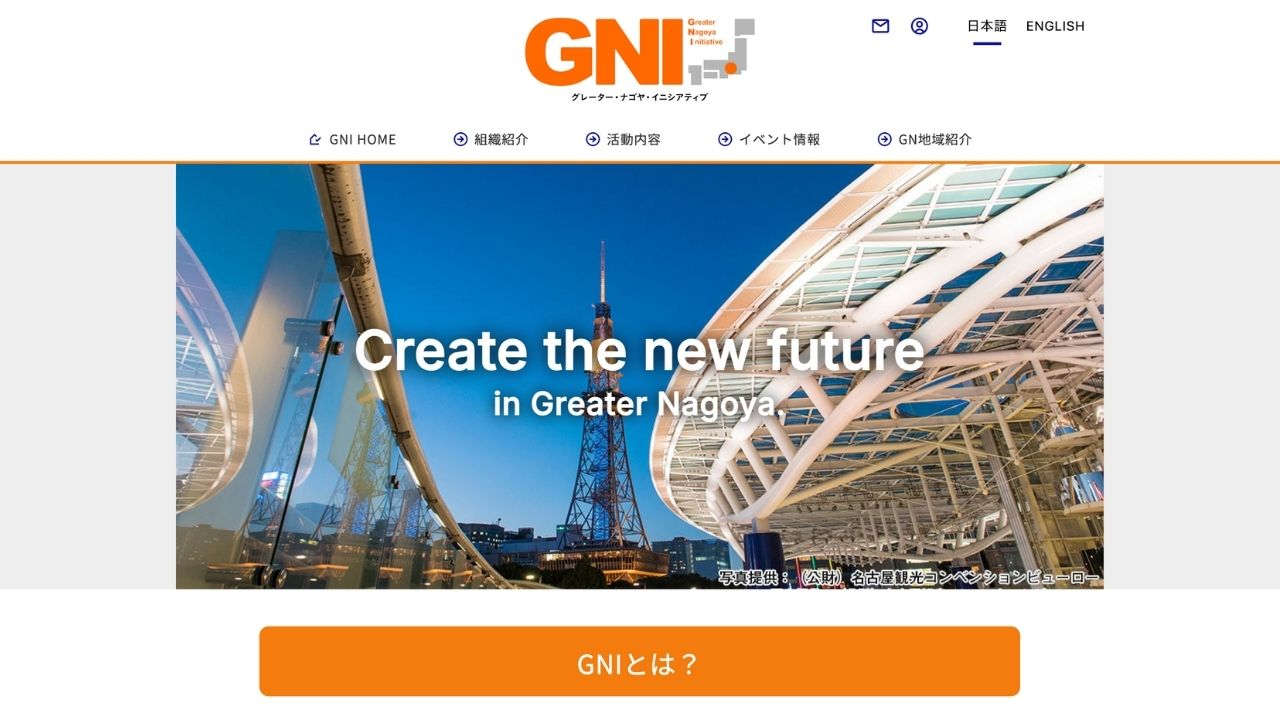
Source : Page d'accueil de GNI
Vue d'ensemble
Il s'agit d'une initiative régionale soutenue par Aichi, Gifu, Mie et la ville de Nagoya pour aider les entreprises étrangères à entrer au Japon. Tirant parti de la force de la région du Chubu en tant que centre de fabrication, elle offre un environnement attrayant, en particulier pour les entreprises des secteurs de l'automobile, de l'aérospatiale et des dispositifs médicaux.
Assistance fournie
- Assistance pour les visites sur site et la sélection de l'emplacement des installations.
- Mise en relation d'entreprises et soutien à la négociation avec des entreprises locales.
- Des bureaux d'assistance en anglais et des informations sur la vie quotidienne pour les résidents étrangers.
Entreprises éligibles
- Les entreprises étrangères qui envisagent de s'implanter dans la région du Chubu.
- Les entreprises impliquées dans la fabrication, la R&D ou la logistique.
Meilleurs cas d'utilisation
- Les entreprises qui cherchent à tirer parti de l'infrastructure de fabrication avancée de Chubu.
- Les entreprises étrangères à la recherche de sites en dehors de Tokyo ou d'Osaka.
Aperçu des coûts
- L'assistance est gratuite (coordonnée par les gouvernements locaux et JETRO).
9. Programmes de soutien des centres UE-Japon
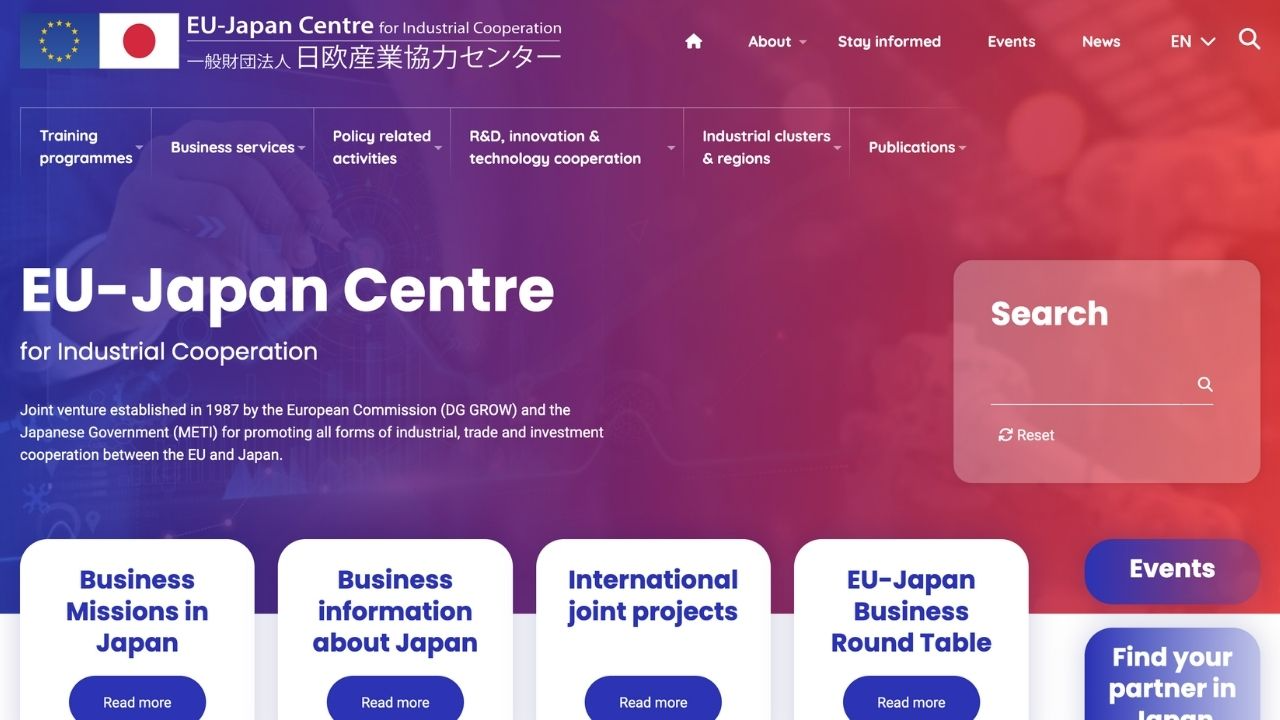
Source : Page d'accueil du Centre UE-Japon
Vue d'ensemble
Cette organisation à but non lucratif a été créée conjointement par l'UE et le gouvernement japonais. Il aide principalement les petites et moyennes entreprises (PME) des États membres de l'UE à pénétrer le marché japonais et à favoriser les échanges techniques et humains. Depuis plus de 30 ans, elle joue un rôle central dans le renforcement des liens économiques entre les deux régions.
Assistance fournie
- Séminaires d'affaires et programmes de formation pratique axés sur Marché japonais.
- Vulcanus au Japon : programme de stages plaçant des étudiants européens dans des entreprises japonaises.
- Mise en relation B2B et soutien pour exposer à foires commerciales.
Entreprises et organisations éligibles
- Les entreprises basées dans les États membres de l'UE.
- Les entreprises, les universités et les instituts de recherche qui souhaitent s'implanter ou se développer au Japon.
Meilleurs cas d'utilisation
- À un stade précoce étude de marché et mise en réseau pour les entreprises entrant au Japon depuis l'Europe.
- Trouver des partenaires pour le transfert de technologie ou la collaboration en matière de recherche.
Aperçu des coûts
- La plupart des programmes sont gratuits ou partiellement subventionnés.
Conclusion
Le gouvernement japonais, les municipalités locales et les institutions publiques connexes continuent d'étendre et d'améliorer les programmes de soutien aux entreprises étrangères chaque année. Ces programmes couvrent désormais un large éventail de phases commerciales, de la recherche initiale et de la création de l'entité au soutien après l'entrée, tel que le jumelage d'entreprises, l'acquisition de talents et l'assouplissement de la réglementation.
Les neuf programmes de soutien présentés dans cet article présentent chacun des atouts uniques et ciblent différents types d'entreprises. Le choix de la bonne solution dépend de votre secteur d'activité, de vos objectifs d'entrée et de votre stade d'expansion. Commencer par une consultation auprès d'un service d'assistance complet tel que JETRO est une première étape importante pour identifier le programme le plus adapté.
L'entrée sur le marché japonais ne se limite pas à une expansion sur un nouveau territoire : elle peut constituer un tournant décisif pour la croissance des entreprises. Nous vous encourageons à prendre un départ stratégique en tirant pleinement parti de ces systèmes de support disponibles.
















